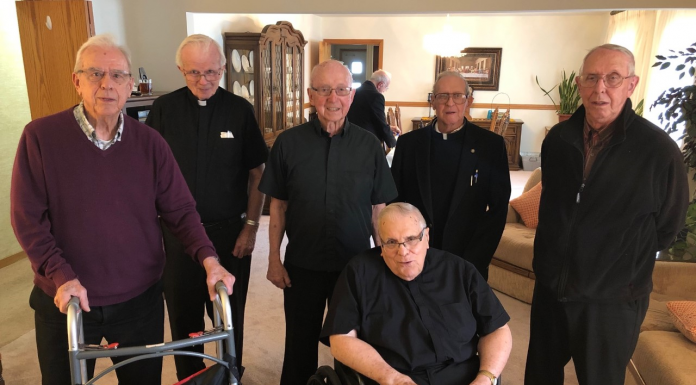Column by Jonathan Nagy
“What does the Lord require of you, but to do justice, to love kindness, and to walk humbly with your God?” – Micah 6:8
A few weeks back, in a personal scene reminiscent of God disrupting Elijah’s sleep, I woke from my slumber very early in the morning with the above Bible verse from Micah running through my head. While often there can be explanations for why certain phrases occupy our minds, this one seemed to have no reason. I looked through my devotional book and that verse was not to be found, nor was it in any of the recent Mass readings I have heard. While my choir at the Basilica sings the hymn Offertory by John Ness Beck, inspired by this verse, we have not sung that song in months. The phrase has occupied my thinking ever since it entered my mind that night, leading me to ponder not only its appearance, but its deeper meaning, and how it applies to my life.
First of all, the word “require” is a strong choice. Ask, request, enquire, and question are all synonyms for this word, albeit less demanding. Answering why God is requiring something of us can be explained by reading the first part of Micah chapter 6. God explained to the Israelites everything that He had done for them, including rescuing them from slavery in Egypt. He presents a strong case for how He has cared and provided for them, and yet He “requires” very little in return. It is important to note that what He is requiring of them, and us, is not only for Him, but for others. His requirement is to care for others in three very specific ways.
“Doing justice” sounds like something that is conducted in a court. Justice is done daily through law enforcement, and judgement is rendered to those found guilty, but that is not the type of justice that God is speaking of here. Justice on earth is one thing; justice in Heaven is a completely different story. Later, in Mark 12:17, Jesus said, “Render to Caesar what is Caesar’s and to God what it God’s.” While the context of that story does not exactly match that of the message of Micah, it is still important to point out that even though our Lord values justice in the eyes of man, justice in the eyes of God takes precedence. We “do justice” for God by lending support, guidance, assistance, and encouragement to others to use their full range of talents and abilities to serve the Lord. As it relates to my life as a Catholic educator, my goal is to not only allow the unique skills of my students to grow, but to foster and promote their fortes. God has given us all a gift of an individual talent, and watching someone unwrap that gift and discover what is planned for them truly impacts the soul. We can all “do justice” by encouraging others to use their abilities to help others, and by doing so, we are accomplishing the first requirement of our Lord.
At first look, “Loving kindness” seems obvious. Everyone loves kindness, and many try to promote kindness in various ways. One of the most used phrases for this is, “In a world where you can be anything, be kind.” Further, Mr. Rogers once said, “There are three ways to ultimate success: The first way is to be kind. The second way is to be kind. The third way is to be kind.” Even The Grinch after his transformation said, “To kindness and love, the things we need most.”
However, another translation of the Hebrew word hesed is “mercy.” In essence, God is calling us to love being merciful to others, which is a much more difficult pill to swallow. In Matthew 25:40, Jesus said, “Truly I tell you, whatever you did for one of the least of these brothers and sisters of mine, you did for me.” Providing mercy to those who truly need it is not glamorous, nor does it come with fame. God is asking us to take care of those who cannot take care of themselves. Yes, this can mean donating money, clothes, food, or time to any number of worthy charities, but it also means giving mercy to those who cannot or will not give mercy to others, showing forgiveness to individuals who chose not to forgive, and complete charitable actions that others feel are beneath them. This is what God is truly calling us to do when He tells us to love kindness. This is an area I know personally can be challenging, especially dealing with “difficult” people sometimes. As my mother always says (which she stole from the rabbit in Bambi), “If you can’t say anything nice, don’t say anything at all.” Showing mercy to someone can sometimes be done by biting our tongues and not saying things that are not helpful. I recently read something called The Ten Second Rule. Basically, if someone can’t fix something in ten seconds, it is probably not worth pointing out. For example, if someone has something stuck in their teeth, telling them that is helpful, but if they have crooked teeth, pointing it out can lead to further embarrassment as they probably already know that they, like all of us, are not perfect. Showing mercy to others can be done by gently guiding them to help and assist, leading them and yourself closer to Jesus in the process.
There are many times in the Bible where walking is mentioned. Adam walked with God in the Garden of Eden, Psalm 23 speaks of walking through the valley of the shadow of death, Jesus walked with the disciples on the road to Emmaus, John encouraged us to walk in the light, and several dozen other examples exist on the subject. In current times, we use the term walk in more ways than one. If I would injure myself in some way, my dad would always say, “Walk it off.” Many, including myself, like to take a walk to blow off steam. Walking humbly with God is something that is more difficult for people than many of God’s other requirements of us. One of my grandfathers favorite hymns, In the Garden, contained the following lyrics: And He walks with me, and He talks with me, and He tells me I am His own. That peaceful image of being able to walk and talk with Jesus is soothing to the soul. If we did get that opportunity, humbly keeping it to ourselves would be a challenge. God is requiring us to walk with Him on this path we call life. In this one Bible verse from Micah, he has already asked us to promote and support each other justly and show kindness and mercy to those who need it. He is now asking us, in the politest way possible, to not brag or boast about it. He is asking us not to take credit for the good we do, nor expect reward or acknowledgement. This can be difficult! People like to be credited or praised for what they do, but in seeking out praise, commit the sin of vanity. Jesus performed the most incredible miracles, and very often He slipped out to avoid the praise. That is something that I know I can work on, and many others can too. When others have complemented my friend Monica on things she is able to do, she says, “To God be the glory!” How profound! Everything we are and everything we do comes from the Father. The praise should ALWAYS be to Him, for He is using us to do His will!
Now, after much thought, I believe God planted this verse in my subconscious to help prepare me for Lent. Each year, I struggle to think of how I am going to make it the most meaningful Lent ever. As a small child, deciding what to give up each year was stressful to me. As an adult, I have moved away from giving something up and instead have tried to do something extra or correct an errant behavior. This year, my goal will be to “do justice, love kindness, and walk humbly with my God.” While I will try my best to accomplish this every day, I know I will not do it perfectly, and I need to realize that God does not demand perfection. He is requiring all of us to do our best for one another, for as we do for one another, we are doing for Him. While the phrase, “What would Jesus do?” may seem overused, it is one of the most truthful reflections. Jesus, in the human form, was the expert at fulfilling Micah 6:8. He showed us that it can be accomplished. We all just need to make the decision to oblige by the requirements of our God. In doing so, we can achieve everlasting Easter joy, in this life and the next!
Jonathan Nagy, M.Ed., is the Dean of Students and Social Studies teacher at Bishop Carroll Catholic High School in Ebensburg. He is also the Music Director at the Basilica of Saint Michael the Archangel in Loretto.






























